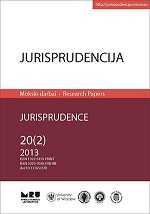Vengimo išlaikyti vaiką probleminiai kvalifikavimo aspektai ir normos taikymo perspektyvos
Problematic Qualification Aspects of the Avoidance to Maintain a Child and Alternative Ways of Child Maintenance
Author(s): Tomas Girdenis, Linas ŽalnieriūnasSubject(s): Law, Constitution, Jurisprudence
Published by: Mykolas Romeris University
Keywords: criminal law; child; family; qualification; crimes and misdemeanors against child and family; children‘s rights; evasion of a child’s maintenance; ongoing offense; end of offense
Summary/Abstract: The article analyzes one of the fundamental rights – the right to maintenance, which proper implementation ensures normal development of the child. This right matches with the duty of parents to maintain their minor children. Paragraph 6 of Article 38 of the Constitution of the Republic of Lithuania states that parents have a duty to educate their children to be honest people and loyal citizens, supporting them until adulthood. The obligation to maintain children is established in the first 3.192 Article paragraph of the Civil Code of the Republic of Lithuania, and the responsibility for avoiding to maintain a child is provided in Article 164 of the Criminal Code. The article discusses the fact that the analysis of criminal law rate is not precise enough. Article 164 of the Criminal Code does not match with the child maintenance methods specified in the CC Article 3.196 paragraph 1. Since criminal liability is only for judgment in default in civil cases, a person shall only be liable for breaking the right to maintain a child, provided in the CC 3.196 paragraph 1. This article deeply analyzes the problematic qualification aspects of the avoidance to maintain a child. Some alternative ways of child maintenance are mentioned, as can be chosen from other law instruments (bailiffs, Guarantee child support fund) and it leads to the ultima ratio principle. On the other hand, it is not required to seek alternative remedies for affected interests, and it is possible to initiate a pre-trial investigation. Therefore, this article seeks to identify specific civil and criminal law rules delimitation. Avoidance of child maintenance is an ongoing crime. The main problem in legal practice is to determine an end of this ongoing criminal conduct. The practice of the Supreme Court of Lithuania is not unanimous. In some cases, the end of this ongoing conduct is considered to be a moment when the past judgment has entered into force, in other cases – the moment of indictment. These positions are criticized by many authors and it is suggested to follow the Supreme Court’s practice, according to which the moment when a judgment of conviction for the criminal act is passed should be considered as an end of an ongoing criminal conduct.
Journal: Jurisprudencija
- Issue Year: 20/2013
- Issue No: 2
- Page Range: 707-723
- Page Count: 17
- Language: Lithuanian

